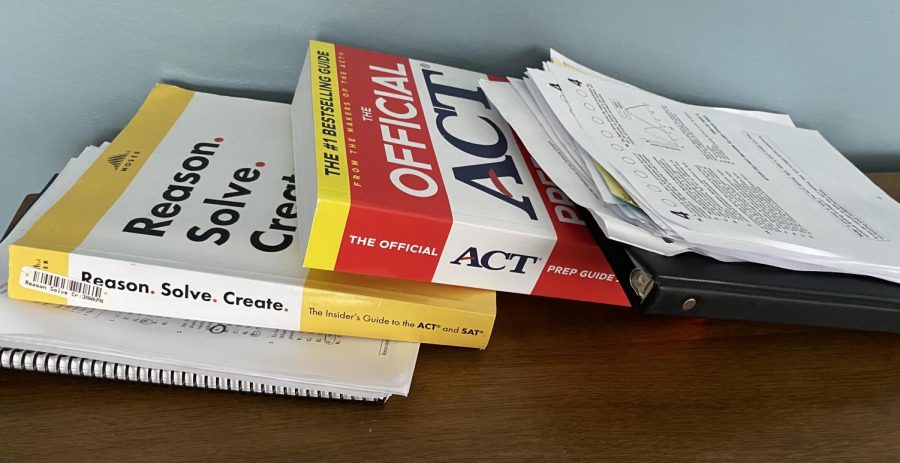Standardized Tests Are Biased and An Inaccurate Measure of Knowledge
Tutors, practice materials, and multiple attempts are all ways students can work to improve their score on standardized tests, but not everyone has access to this making the test extremely unfair and inaccurate for its purpose. The SAT and ACT are pen and paper, multiple-choice tests given by the College Board. The purpose of these tests is to measure how ready a student is for college and predict how academically successful that student will be in his or her future. The tests compare students on a range of scores. The best scores can allow for students to attend the most prestigious schools in the country and get scholarships, but how fair is this process?
People who cannot afford aids such as tutors and practice tests are at a clear disadvantage to those who can. In fact, according to The Washington Post, “On average, children whose parents make more than $200,000 a year score about 250 points higher on the SAT than children whose parents make $40,000 to $60,000.” That statistic clearly shows how lower-income families are put at a disadvantage. Scholarships needed to even be able to attend college are swept away by families who are in a much more comfortable position to pay for college. Such a huge gap between poor and wealthy is undeniably wrong in such an important aspect of our education systems.
Not only is there a gap between the wealthy and the poor but also in racial minorities. An article written by Time elaborated on this issue saying, “The recently filed a complaint with the U.S. Department of Education pointing out that black and Latino students in New York score below whites and Asians on standardized tests so consistently that although they are almost 70% of the overall student body, they are only 11% of students enrolled at elite public schools. As a result, the compliant argues that New York City is in violation of the 1964 Civil Rights Act because schools rely on a test that advantages one racial group over another.” Standardized tests unfairly advantage white and Asian students and disadvantage the rest. These gaps persist even though there have been decades of research done attempting to explain and stop them, but it might just be time to stop relying so heavily on standardized tests. Another article from The Washington Post states, “A student with a parent with a graduate degree, for example, on average scores 300 points higher on their SATs compared to a student with a parent with only a high school degree. No doubt this is the same dynamic reflected in the income graph, given that there are high returns to college education. But it also dispels the notion that students in America have good opportunities to advance regardless of the family they’re born to.” This could be a part of the racial gap, either way, it is hard to see why we rely on these tests as a country is they create so many disadvantages.
Some may say that your ACT and SAT scores are not important because GPA and the rest of the application process is more important, but students who submit good scores will stand out and be higher on the list of prospective college students. According to an article written by College Raptor, “The scores on the SAT and ACT allow them to narrow down the playing field and make decisions on acceptance. This also makes your individual score extremely important. The schools that are receiving 75,000 applications don’t have time to read every document, transcript, or essay.”
In my own experience of preparing and taking the ACT, I know how stressful and difficult it is. Even with having tried more than one tutor and other practice materials these standardized tests create a ton of anxiety and stress in students who are not great at taking tests. All of this stress and anxiety can heavily impact a student’s scores. These tests are biased towards those who are good at test-taking rather than the actual intelligence of the person and “readiness for college.”
DU, one of the first schools that chose to make submitting test score optional, wants to focus on grades as well as extracurricular activities knowing that some students have access to more prep materials. “Oftentimes an ACT or SAT score is more reflective of a student’s economic background and the resources of their school, rather than demonstrating the student’s academic abilities and college preparedness,” said Todd Rinehart, vice chancellor for enrollment. “We want to place our focus on curriculum and performance in school, and provide students the choice as to how their academic record is presented.”
Forbes came out with an article explaining lawsuits on the University of California system saying, “New lawsuits are demanding that the University of California system eliminate the requirement that students take the SAT or ACT to be considered for admission. The lawsuits, filed on behalf of the Compton Unified School District, four students and six community organizations claim that the tests are biased and don’t predict a student’s potential success. There is ample research to support their case against the tests.” Other schools have recognized this bias and taken action by becoming test optional. Over 1,000 colleges and universities are now test optional. That is, students can choose whether or not they wish to include test scores in their application. Continuing to express our opinions and hold the college board accountable is very important in overcoming this faulty application process.







